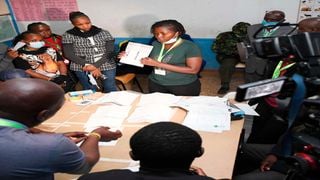
Vote counting during the 2022 polls.
| File | Nation Media GroupOur Columnists
Premium
Dear politician, love those who voted against you
Many people usually ask, if one wanted to get the best political lessons and enhance their political skills, which book should they read? The answer is simple: The Bible.
Many use the Bible for spiritual purposes. This is completely good and proper.
But inherently, it has impactful and deep political lessons that may not be obvious to a simple eye. One of the most important biblical lesson is that of loving one's enemy.
The bible records Jesus as saying in Mathew 5 :43, “You have heard it was said, ‘You should love your neighbour and hate your enemy.’ But I say to you, love your enemy and pray for those that persecute you so that you may be sons of the father in heaven. For he makes his sun rise on the evil and the good, and he sends rain on the just and unjust. For if you love only those that love you, what reward do you have? Do not even tax collectors do the same? If you only greet your brothers, what more are you doing than others? Do not even gentiles do the same?”
This works dramatically in politics. But many leaders seem unable to understand the political logic of this biblical lesson.
No one ever wins a political contest with a 100 per cent voting bloc. Often there are regions that vote against them. But how do you handle regions that did not vote for you? The first but simplistic impulse for some winners is to discriminate those regions when it comes to development, for example. For losers, they will be tempted to complain how the elections were stolen.
But the wiser strategy is to do the opposite — reach out to the regions that did not vote for a leader with the aim for turning them to one's advantage come the next election.
Often, people will vote against a leader not necessarily because of hate. Therefore whoever lost should not really blame the people. He or she needs to simply court such people ahead of the next election.
Two thoughtful leaders understood this point. One was Abraham Lincoln, the president who led America towards abolition of slavery and retention of the Union when some states attempted to secede.
The story is told in The Team of Rivals: The Political Genius of Abraham Lincoln by Doris Kearns Goodwin.
It is a biographical portrait of Lincoln and some of the men who served in his cabinet from 1861 to 1865.
Three of his cabinet members had run against him previously in the 1860 elections. The book tells the story of his successful attempts to reconcile conflicting personalities and political factions towards abolition of slavery and maintenance of the Union.
This inspired President Barack Obama to reach out to Hillary Clinton after their 2008 fierce nomination contest and grant her a prime opportunity in government. Probably this helped him win twice.
The other thoughtful politician was Nelson Mandela. Mongusthu Buthelezi was a Zulu nationalist who became Mandela’s most bitter rival as South Africa transformed into a free country in the 1990s.
Zulus are the largest ethnic group in South Africa and Buthelezi led them in violent clashes with Mandela’s ANC.
Similarly, Mandela faced white leader De Klerk in 1994 elections. After winning, Mandela found it wise to incorporate the two enemies into his government: De Klerk became his Deputy and Buthelezi Minister of Home Affairs. Mandela became a global icon of good leadership and had a stable government.
Azimio la Umoja probably needs to pick this lesson of loving one’s enemy. It seems struck to the point of “election rigging” in 2022. This can only aggravate the schism between Azimio and those that voted against them – it is not a lure.
But President William Ruto seems to be doing exactly the opposite — going into the regions that did not vote for him, hence practising the doctrine of “love your enemy”.
In 2013, I went for the then popular TNA nominations in my bid to be Kiharu MP. I got about 18,000 votes, my closest rival had 10,000 and a third force had 6,000. The incumbent did not come for nominations but waited for me in the General Election with the ticket of a “sister party”. We then discussed ways of vanquishing the incumbent in the finals with my advisors. Some advised I should concentrate in boosting my strongholds and ignore my weak areas. But I reasoned that every Kiharu person is equal and probably those that voted for other people did so because they did not know me. I, therefore, put my best foot forward in the weak areas. The strategy worked miraculously against the incumbent.
In hindsight, if we did not reach out to supposed “enemy” territory, those regions would have swung in favour of the incumbent.
Brothers and sisters in politics, Jesus meant it when he said enemies are to be loved, not excluded. Exclude them and they will form a fertile ground upon which political opposition will spring.
The writer is the Governor of Murang’a County. Email: franciskangataik@gmail.com


